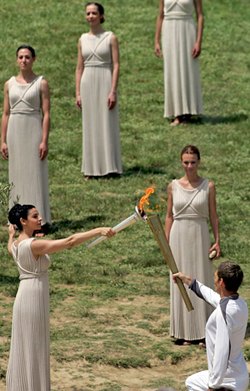 The countdown to this summer's London Olympics kicked off with the kindling of the Games torch by the sun's rays in ancient Olympia on Thursday, sparking a relay that will culminate with the lighting of the Olympic stadium's cauldron at the opening ceremony on July 27.
The countdown to this summer's London Olympics kicked off with the kindling of the Games torch by the sun's rays in ancient Olympia on Thursday, sparking a relay that will culminate with the lighting of the Olympic stadium's cauldron at the opening ceremony on July 27.On a warm and sunny day at the site of the ancient Olympics, actress Ino Menegaki, playing the high priestess, needed only a few seconds to ignite the torch with the help of a parabolic mirror in this traditional ceremony less than 80 days before the Games get under way.
The relay's first torchbearer, Spyros Gianniotis, a Liverpool-born Greek swimmer who won the gold medal in the 10km open water event at the 2011 world championships, started the seven-day Greek leg of the relay before the flame is handed over to London organisers on May 17 and flown to Britain a day later.
"With this ceremony we begin the final countdown to a dream that came to life seven years ago in Singapore, when London was selected to host the 2012 Games," said International Olympic Committee President Jacques Rogge in a brief speech.
This is the last torch ceremony of his presidency, as Rogge steps down next year after 12 years in charge.
"The energy that passes from the sun to the Olympic flame will light a torch that will travel from this birthplace of the ancient Olympic Games to the country that invented modern sport and the spirit of fair play, heralding the opening of the 2012 London Games on July 27," the Belgian surgeon told Olympic, London and Greek officials inside the stadium where the ancient Games were held.
Several thousand spectators also watched the ceremony from the grassy slopes hugging the ancient sports arena.
POLICE PRESENCE
A strong police presence around the ancient site, and in the town of Olympia, made sure the event went off without a hitch. Four years ago human rights activists managed to briefly disrupt the Beijing Olympics ceremony.
London becomes the only city to have received the Olympic flame twice -- first for the 1948 Games.
Britain's capital also hosted the 1908 Games, but the torch lighting ceremony and relay were only introduced for the first time for the 1936 Berlin Olympics.
"I feel incredibly excited and I think it's a very, very big moment," London Games chief Sebastian Coe told Reuters.
Coe, a twice 1,500 metre Olympic gold medallist, visited Olympia in 1975 as an 18-year tourist, hardly expecting to be back in 37 years to watch the torch being lit for an Olympics hosted by the UK.
"For me, it really links what I did at Los Angeles and Moscow (Games) with the ancient Games. I think for me this is probably the moment that what I did in '80 and '84 properly comes into context," he said.
The British leg of the relay will travel 12,800 km around the country, taking in 1,018 villages and the 1,085-metre summit of Snowdon, before ending inside the Olympic stadium on the opening day of the Games on July 27.
The relay will also take in landmarks around Britain with the flame travelling by canal boat, cable car, tram, steam train, hot air balloon and even motorcycle sidecar on the Isle of Man TT course.
More than 95 percent of the population will be within an hour of the route.




Comments
Add new comment